
Estimated reading time: 13 minutes
Today we are going to be discussing SEO Strategies that are already working on RankBrain.
You must be absolutely sick of reading SEO predictions for SEO, that is exactly why this guide is not one of those posts. We are basing our guide on strategies that are already being implemented, already working, and should work even better as the year progresses and RankBrain takes a more prominent place in the search results.
Related Links
As with every year or for that matter every month, week, and sometimes hour the SEO rules are changing and they change fast. As most SEOs know there are at least 500 Google algorithmic changes. Most of them are small enough that they go unnoticed. However, all of the changes combined are a big enough force to make most SEOs rethink strategies, especially once a year.
When I say rethink, I am talking about bettering our SEO strategies. Every time Google changes its algorithm with a new update it tries to make its search engine easier or more friendly for its users. So Google is trying to serve its users with the best-targeted content. This is why as marketers we need to stay on our toes because our goal is to deliver users the best-targeted content as well. Check out https://localclienttakeover.com/courses/google-my-business-seo-specialist/ for effective local lead generation.
Today In SEO – What You Can And Should Be Doing To Get Better Rankings
To summarize most everything that you will read below. It’s time that you start creating authority content. This is like you are doing a scientific study and we all know that in academia you either publish or you perish. This is the common phrase or motto that a lot of people in the SEO world are saying.
This year, don’t expect to simply publish content and be done with it. We will not have amazing SEO-Changing content without game-changing copywriting.
But, let’s get down to the nitty-gritty and talk about the most important factors in the SEO world this year.
1) RankBrain Is The New Master
All the way back in 2017, (no, not just a month ago), Google made a major announcement and made us all aware that Artificial Intelligence will be running the search. As you may have guessed the name of the new AI Algorithm is RankBrain.
Have you been wondering what it is exactly that RankBrain does? Good, because so have we, and now we have answers.
The first thing this AI will do is learn from human users. It then uses the knowledge it gained to start ranking websites accordingly.
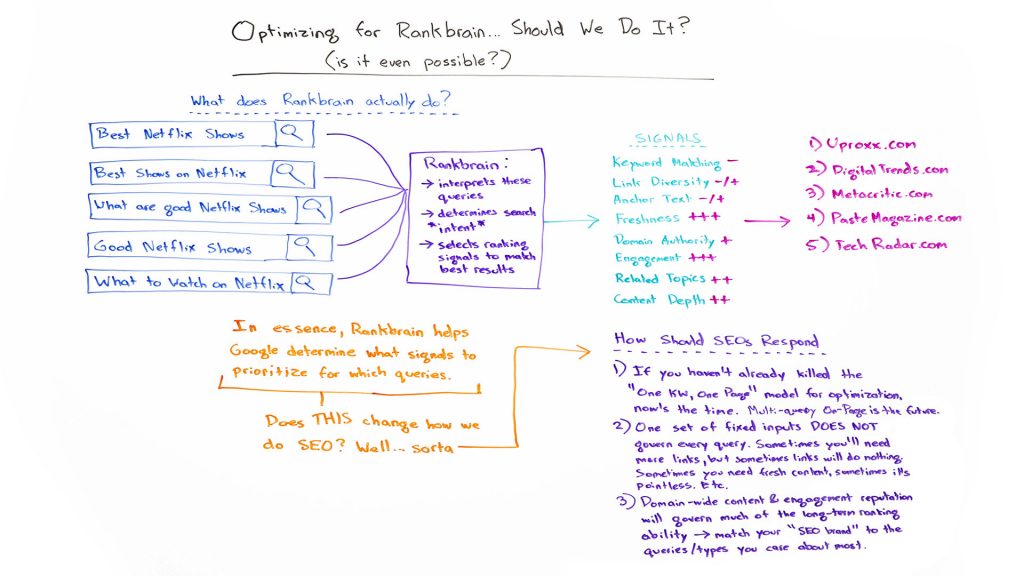
To give you an example, which should make this a little easier for you. Say you’re looking for a recipe for an item of food that you only had in your school cafeteria.
The pizza pinwheel school recipe. The results on Google might look something like this:
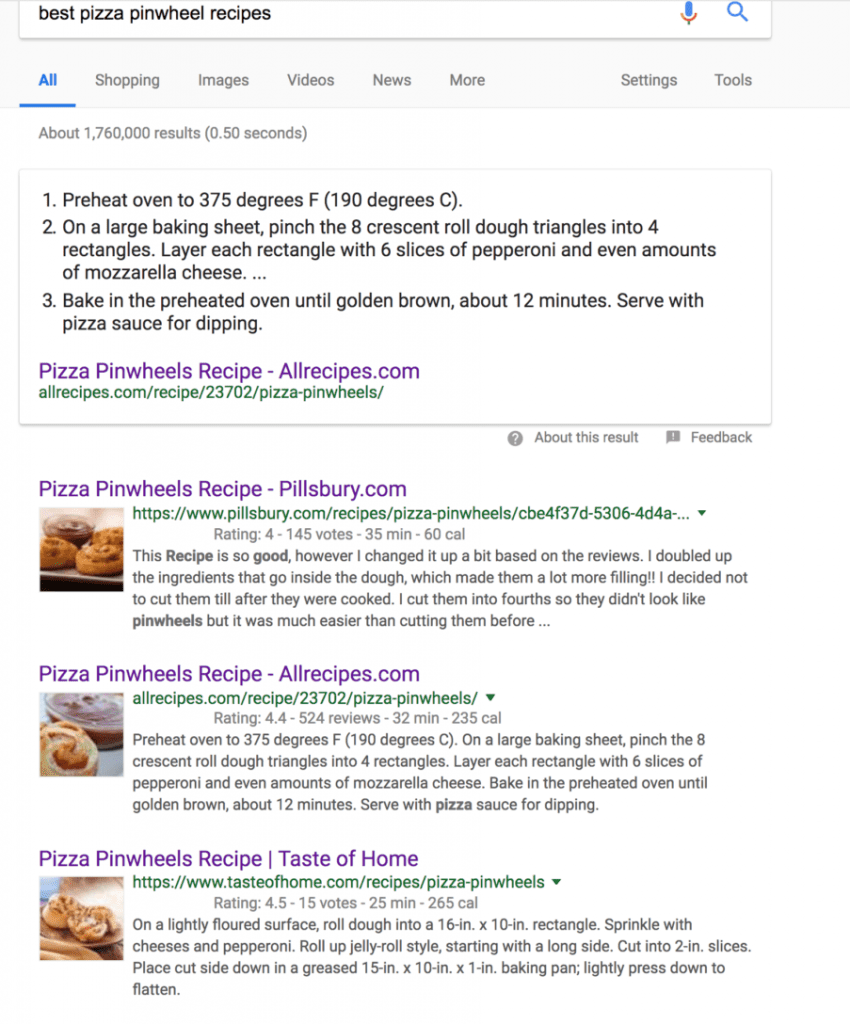
You click on the first result in Google and it looks like this:

You know it’s the first result in Google, but you are hosting a large event with a lot of people that went to your home high school. You know full well the pizza pinwheel has to be perfect because it was the number 1 best lunch item in the cafeteria. I think that day increased school attendance However, you notice the first link has poor images and this is an indication that you have not found exactly what you are looking for. The recipe has good ratings, but it could be people who never had the real juicy thing.
You probably figured all of this out in less than 5 seconds, definitely less than 10 seconds.
Now is the point that you save yourself some time and head back to the SEPRS and click the 3rd link that you previously saw that offers at the least better pictures and more recipes to choose from, we can’t pick a good pizza pinwheel recipe from just one example now can we. Out of the recipes on this page, the odds of you finding the best one here has gone way up. This means you are going to stay on the site for a while, you will most likely compare the recipes. Finally, you will choose the best recipe and might write it down or at least write down the ingredients.
Here are 2 of the promising recipes I found on the second site:
Recipe #1
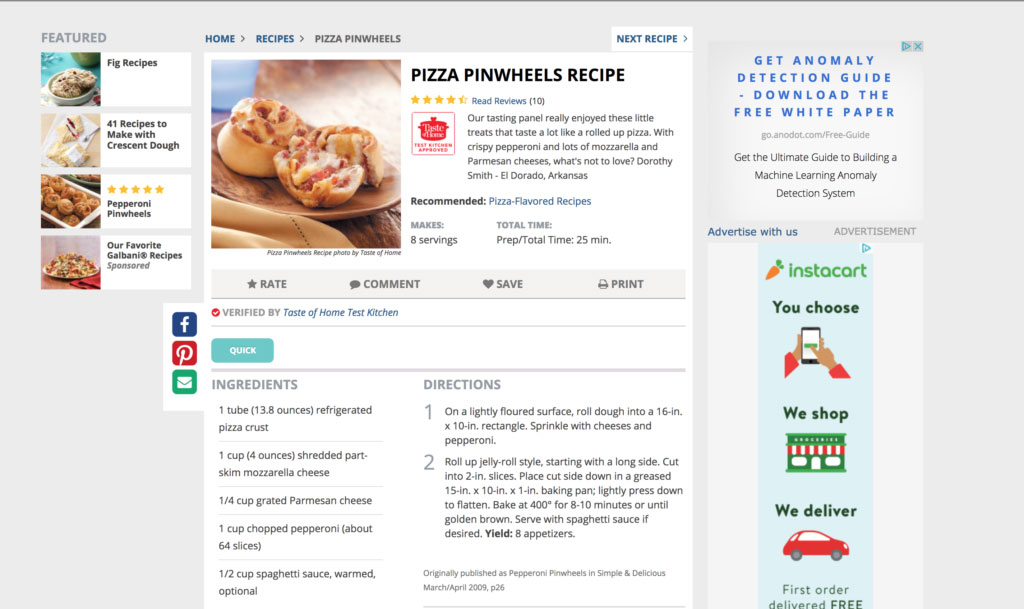
Recipe #2
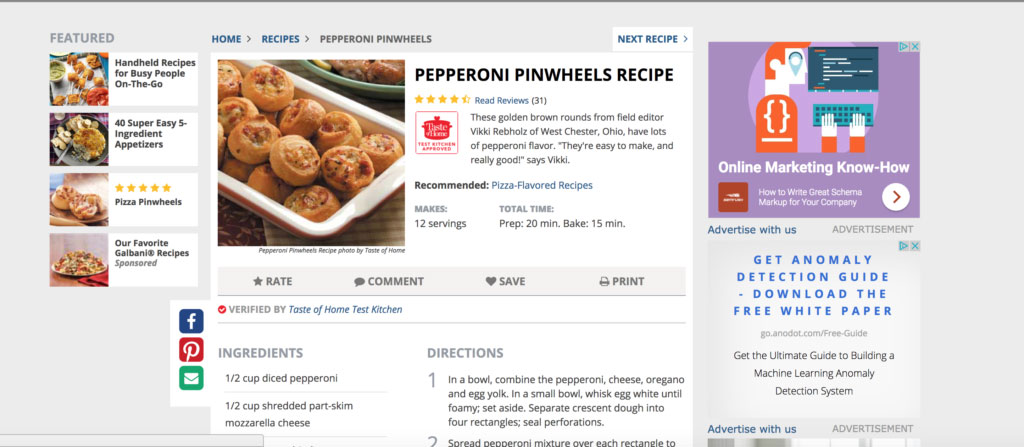
What does RankBrain do when all of this is happening? RankBrain is noticing and if others follow the same pattern that you did, RankBrain comes to the conclusion that the result in the first position isn’t good enough for that spot. RankBrain learns that the third result is exactly what you were looking for. Now Google’s artificial Intelligence will penalize the 1st place result and boost the SERP ranking of the third listing.
This is an easy conclusion that authoritative content wins again.
2) It’s time to think about your Organic rankings the way they were always meant to be thought of “Organic Rankings”.
Just because we are using the term “organic” doesn’t mean we are talking about food or living organisms. But, should we be thinking about organic as living organisms?
As you can see from the above example. When it comes to SEO, there is nothing that is ever set in stone with rankings. The SERPs are evolving as you read this.

You may be sitting pretty in the number 5 position, thinking you are on your way up. But, all it takes to drop you to position 25 are new or even old competitors that deliver copy that is simply better than yours. If you get that mixed with a few quick bounces off of your page, you might kiss your rankings goodbye.
You know and I know that there is nothing to do if your competitor hires a good copywriter or has someone on their team with superb writing skills. But, what you can do is make sure your writing skills are either at the same level or better than your competitors. Most importantly publish regularly which will give Google’s spider bots a great chance of finding new content every single time they crawl your site.
3) If You Haven’t Been – Get Conversational
With so many devices using voice search now and with that number only increasing we are in a major need for a conversational tone which includes your written content. We have Alexa, Siri, and the Google home and they are here to stay because they make your life easier.
When doing voice searches don’t usually speak in a non-natural phrase that sounds like you are talking to a robot. For example, people don’t usually say “salad”, but are more likely to use more complex conversational language. You probably already talk to one of these devices and probably say something closer to this: “Alexa, how do I make a Cesar salad at home?” or “Siri, what is the best Cesar salad close to me?”
What Does This Mean For You As A Marketer
First and foremost it’s time to start creating content that is more conversational.
As I have always said and it still applies do not shy away from long-tail keywords. In fact, it’s the opposite, as you will never see a lower search volume from long-tail keywords, the overall words might have a lower search volume now, but that will not last. These long-tailed words also bring in a ton of more targeted traffic. If you are seeing more targeted traffic, it means people are clicking on your link and will most likely stay longer on your website. (This goes back to the importance of BrainRank).
4) Long Form, In-Depth Content Wins
Let’s say a long long time ago on a distant star, Google bots used to crawl your website pages and check the number of times a keyword was used in your copy. The more your page had the better it was for rankings. The truth is it wasn’t that long ago and we remember the simple, now at least grey-hat technique that caused a polluted internet. It was because these keywords gave the user zero-value, which means that keyword-stuffed website content was the king of the jungle.
Nobody liked this, Users complained about it and because of that Google got smarter.
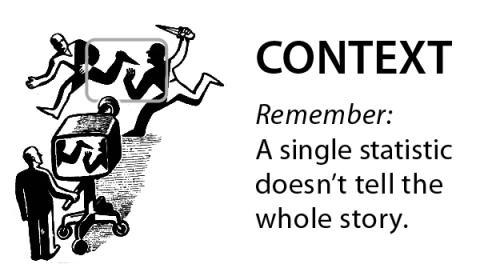
With BrainRank being at least 98% different, keywords density still does matter, but it’s really not as much as some marketers would hope and definitely not as much as you think. Google’s bots have new things to look at, including keywords in the URL, image ALT tags, meta descriptions, H1 tags and much more.
Would you believe that the most important thing being looked at is CONTEXT?
Google knows the words and or phrases that are usually associated with other specific keywords, which means Google is looking for those connections. I like to call these synonyms or LSI keywords. The difference is going to be that a synonym is another word that has the exact meaning of the keywords. Whereas LSI keywords are semantically related, however, the word might not have the same meaning.
We all know what a synonym is but how are LSI Keywords used to help the search engine understand your topic without stuffing keywords, but keeping your blog on topic all at the same time. An example:
Computer – Desktop – The Main Word Is Computer
The words that you could include might be
- Desktop
- PC
- Computer Office
- 2 or 3 screens on my desk
- Need a new tower
- Need a new desk, etc
There are resources out there to help you (find LSI keywords)
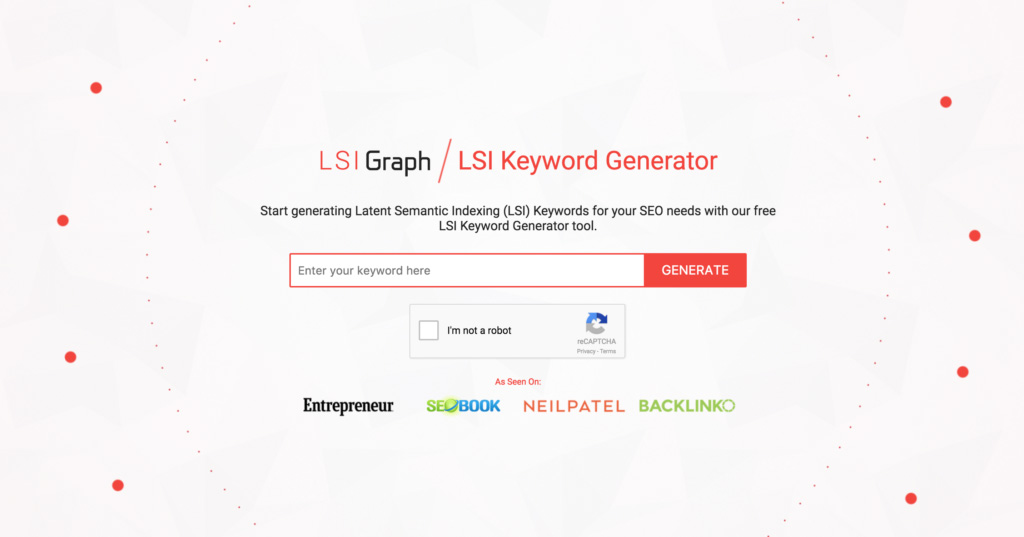
Of course, with any keyword on any topic, we could keep the list going forever. Hopefully from this small list, you get the point, basically, Google needs context and it’s your job to give it context by using words similar to the ones on the above list. These words are called LSI Keywords.
I have written several articles about LSI keywords and you can read one of them right here.
So how exactly does any of this have to do with you and long-form content? It’s really a quick connection. The more context you put into your articles, in the long run, the better you will rank. For this to be a real possibility you need a chance to use all of the LSI keywords as possible, you need to always outperform your competitors in every way including having more words. A tiny 300-word article will never make the cut.
If we are talking about the ideal post, you will want to keep your posts around 2,000 words. It’s even better if you can write more than 2,000 words. If you are trying to cover every single piece of the topic then you need more room and more room means more words and guess what this means greater CONTEXT. This all leads to your users staying on your page longer and leading to a lower bounce rate.
But, if you learn anything, let it be that you should never just write to write. Rambling on just to reach your target word count can hurt you in the search rankings. You must remain natural, and be sure that you are covering your topic as in-depth as possible, but whatever you do, don’t go overboard – After all, you aren’t trying to make a Wikipedia page are you? Well maybe you are, but hopefully not!
5) Don’t Ignore Mobile
The number of Searches on Google via mobile devices is only going up. The number will only go up every day with no drop in sight.
This is why we are seeing Google switch to a mobile-first index.
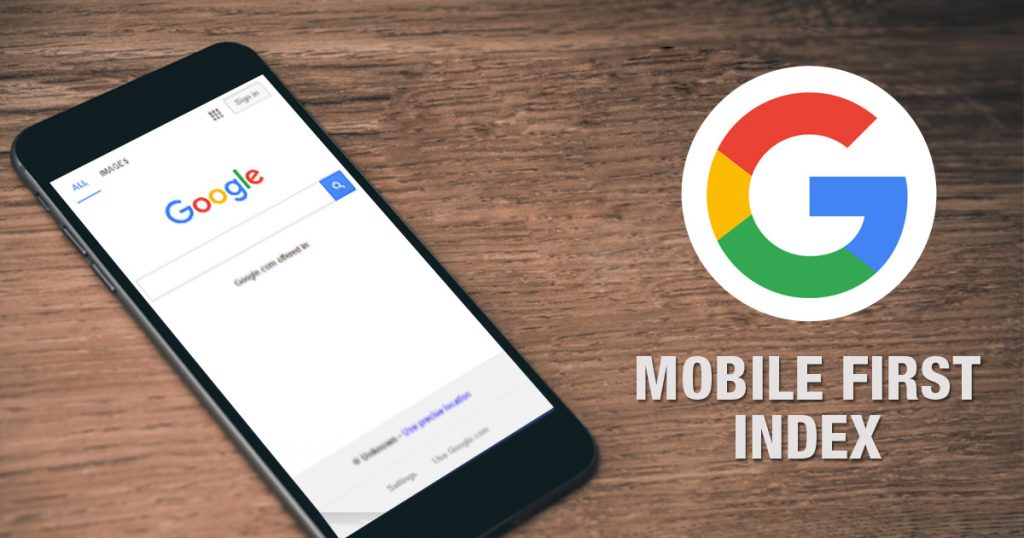
What we are saying is that your mobile page is going to be considered your reference point for your rankings by Google bots. You will have non-mobile optimized pages appearing in your desktop searches, but those pages will be invisible to mobile searches.
What are you supposed to do as a Marketer to alleviate this problem?
The first thing you want to do is make sure your website is mobile-friendly, which we’ve been told for the last 2 years or so. Here’s how you are going to do that:
If you still haven’t switched to a responsive version (this ensures a seamless experience across devices) instead of a mobile one version of your website It’s time to do that.
If you are hiding the copy behind buttons, such as your read more buttons stop doing that because Google will not be able to see the copy.
Check, double-check, and triple-check that your website is easy to use on all mobile devices. Just because it’s responsive doesn’t mean you won’t see glitches. Responsive sites have glitches too and sometimes they are worse than you might think.
The Key Takeaways:
There is an old saying and I don’t really remember who said it, but it goes like this: “The more things change, the more they stay the same.” Of course, this is true in music, fashion and most things in life. This old adage is true for SEO as well. I just wrote about tons of changes and techniques that are working, but in the end, all of the changes still point you in the same direction. We all want it, Google wants it — User Friendliness, Better Content, and Better Context.”
Like we always say write for the user first, write for the Google bots second and here is why. If your users or readers love your content then so will Google. We said it last year and we’ll say it again this year. GET REAL! Get HUMAN! Write for real people, write for your brother, write for your cousin the plumber, write for the corporation (they are people …Right?) Don’t write for bots.
When you are writing SEO Copy don’t worry about your keyword density, for at least just a moment focus on context and going in depth. Did you find the perfect Pizza Pinwheel recipe? Well just like that search, your readers can find your fake card in your writing and they will know you are faking it. Just like if your users are happy, the bot will be too. It’s time to give them both something useful, something real and this way they will flock to your website and the RankBrain will know what to do from there.
Contact Matchbox Design Group Today!
If your website could use a refresh or you’re looking to drive more traffic to your site, fill out the form below and we’ll contact you to learn more about your digital needs.

